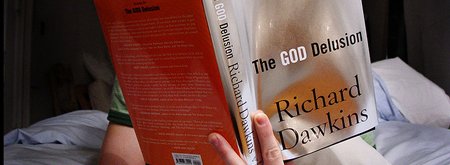Richard Dawkins Debates Alister McGrath
In Oxford last week, Richard Dawkins (The God Delusion) and Alister McGrath (The Dawkins Delusion) sat down and had a conversation. They actually talked. This is astonishing since, while it’s normal in academic life to face your critics, to engage with your peers as an important part of the process of eliminating straw men (false caricatures of a perspective that are much easier to demolish than the real thing), it is not normal for Richard Dawkins.
When it comes to his famously confrontational and negative views on faith and Christian belief, it is extremely rare for Dawkins to engage with his critics face-to-face. Dawkins is famed as much for his refusal to engage with his academic peers in these subjects as he is for his zealous rhetoric. He recently refused to debate a leading philosopher of religion, William Lane Craig, with the unassuming response, ‘It wouldn’t look very good on my CV would it?’ In fact, it would have enhanced his credibility enormously in the eyes of people like the atheist philosopher of science, Michael Ruse, who commented, ‘I would like to see Dawkins take Christianity as seriously as he undoubtedly expects Christianity to take Darwinism. I would also like to see him spell out fully the arguments as to the incompatibility of science (Darwinism especially) and religion (Christianity especially).’[1] He has also written, ‘The God Delusion makes me embarrassed to be an atheist, and the McGraths show why.’[2]
In the conversation with Dawkins, McGrath decides to try and deal specifically with what he calls the strongest argument in Dawkins’ book: Is there a link between violence and religious belief? He says:
Religion can be an immensely powerful transformative force for good, and wherever those [wrong] actions take place they need to be condemned. Take the case of Harold Shipman. It would not have made sense to say afterwards, “Doctors are bad.” There are those in every movement who are regarded as dangerous, regarded as extremist, and the mainstream are trying to marginalise in order to try and ensure that their religion is what it is meant to be.
Dawkins counters:
If every good deed in the world was done by a religious person, that wouldn’t move me in the slightest, because what I care about is what’s true. I want to know, is there a God in the universe or not?... He said that religion is intellectually enriching. That, I must say, I find harder to take. I should have thought it was intellectually impoverishing in the sense that it cuts off investigation by providing easy, facile answers to deep and troubling questions, like the questions that science tackles. If there are some questions that science can’t answer, what on earth makes anyone think that religion is going to fare any better?... Insofar as religion tries to answer those questions it is stultifying and impoverishing and limiting, not enriching.
I’m not sure that Dawkins was being entirely fair here by jumping subject – and notice that he doesn’t actually respond properly to McGrath’s rebuttal of his main argument, that religion is linked to violence.
McGrath eventually has the opportunity to challenge Dawkins’ view directly about the incompatibility of Christian belief and a scientific understanding of the world:
You seem to be saying that there is a scientific explanation and that ends everything. I would want to say that maybe there are levels of explanation. There may well be a scientific level of explanation, which is helpful insofar as it goes, but then we may want to add other things onto it which are not necessarily, in themselves, scientific but nonetheless significant in themselves.... I think you are saying that a scientific explanation may be incompatible. But I think they are things that can exist side by side, both being present, but operating at different levels.... For me, my personal faith has something very simple, and very powerful, to say. It is saying that one may appreciate this world and see it in all its beauty, all its glory, but at the same time be aware that this beautiful world points beyond itself to something else, an invitation to discover, an invitation to move beyond the limits of where we are and discover something else as well which is both enriching and, in my view, ennobling.
Dawkins is to be commended for caring ‘about what’s true.... is there a God in the universe or not?’ That is, he is to be commended if he really does care. His complete dismissal of any other level of explanation than the scientific suggests, as many of his comments do, that he has prejudged the issue. It seems he cannot even consider the possibility that the world could point beyond itself.
References:
[1] www.americanscientist.org/template/BookReviewTypeDetail/assetid/28365 [no longer available].
[2] Front cover of The Dawkins Delusion, (SPCK, 2007).
 Book title: The God Delusion
Book title: The God Delusion
Author: Richard Dawkins
Keywords: Science, atheism, religion, faith, belief, truth, evidence, explanation
Publisher (h/b): Bantam Press (UK); Houghton Mifflin (USA)
Pub. date (h/b): 18 September 2006 (USA); 2 October 2006 (UK)
Buy The God Delusion from Amazon.co.uk or from Amazon.com
Buy The Dawkins Delusion from Amazon.co.uk
© 2007 Tom Price



